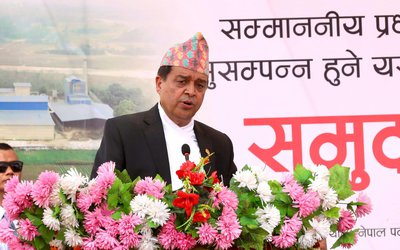The 1MDB or the 1Malaysian Development Berhad Scandal is one of the biggest global scam to be initiated by Goldman Sachs Corporation which left the ordinary civilians of Malaysia with a debt of more than USD 13 billion along with the destruction of the economy and fall in confidence of the then government led by Prime Minister, Najib Razak. 1MDB, which was inaugurated as the official Sovereign Wealth Fund (SWF) of Malaysia, has been touted as the biggest blunder in the history of financial investments, across the globe.
Generally, a Sovereign Wealth Fund is built to bring in vast pool of money into an economy with one valuable resource (like oil). It can also be viewed as a process of diversifying one’s risky ventures into profit generating activities. Presently, there are 78 SWF’s in the world with an accumulated value of over $8 trillion which is almost 10% of the worlds GDP. But SWF’s are generally prevalent in non-democratic countries and are controlled by autocrats which widens the scope of money laundering and other illegal transfer of such revenues.
What went wrong with the 1MDB?
Najib Razak has been accused of channeling over RM 2.7 billion (approx. USD 700 million) from the 1MDB, a government run development program to his own private bank account. This illegal transfer of money was carried through ‘SRC International’, a previous unit of 1MDB. Such siphoning off of state fund has left the Malaysian economy in a debt of over RM 42 billion and has affected the financial functionality of four other continents. However, at the heart of the 1MDB scandal lies the involvement two former employees of Goldman Sachs- Tim Leissner and Roger Ng, one fugitive Malaysian businessman- Low Taek Jho, 1MDB’s former general consul- Jasmine Loo Ai Swan and a naive economy which was promised to be elevated from a middle-income trap to the status of a high-income nation. Previously condemned with cases related to price manipulation, insider trading, gender discrimination and security fraud, Goldman Sachs arranged for the issue of bonds whose sales raised up to USD 6.5 billion for 1MDB and in turn the company took home a whooping amount of USD 600 million for its services, which according to the United States Department of Justice (US-DOJ) is almost 200 times more than what someone can make from such schemes.
Both the bankers, Tim and Roger have apologized for conspiring to launder money and violate the US Foreign Corrupt Practices Act, but the Malaysian Financial Minister, Lim Guan Eng says that USD 7.5 billion is needed in reparation from Goldman instead of an apology from the former partners. The two partners have also confessed in bribing officials in Malaysia and United Arab Emirates to get bond deals for Goldman Sachs.
Cited as a masterplan formulated between Najib and Jho Low, huge sums of money was borrowed in the form of government bonds from 1MDB and deposited into the personal accounts of those who were supposed to benefit from it. But Najib strongly denies such allegations by clarifying that those transfers were made in the form of gifts to him by an anonymous Saudi Royal family. Malaysian businessman Jho Low was brought in as an executive consultant/financial advisor to monitor the economic activities of 1MDB but has been accused of forging money to purchase USD 10 billion worth of personal property, gems and jewelry, art, private jets and superyacht. USD 10 million was also siphoned off for the illegal funding of various Hollywood movies through the production company- Red Granite Pictures, such as ‘The Wolf of Wall Street’, ‘Dumb and Dumber To’ and ‘Daddy’s Home’.
How did Goldman Sachs carry out such a risky venture without any fault in its part?
Goldman Sachs have carried on various risky investment in the past too with little to no accusations on their part. But for 1MDB, it laid heavy emphasis on two of its biggest strengthens:
- Leverage: The company leveraged their expertise which helped them extract revenues from developing and low-income countries. The company furthered their involvement in such poor economies by taking the least sophisticated product with the aim of selling it to the least sophisticated buyer and along the way, generating enough revenues for the entire company without any regard to the repercussions that might be felt by the host or domestic economy where they are operating.
- Reputation: The company also helped in making 1MDB seem more genuine. Before associating itself with Goldman Sachs, 1MDB had no credit ratings, it was only after the multinational bank introduced the scheme as a valid investment opportunity that global capital flows started pouring into Malaysia. Goldman, discreetly saw this as a chance and paired 1MDB with Abu Dhabi’s Sovereign Wealth Fund- Abu Dhabi Investment Authority (AIDA) which raised approximately USD 6.5 billion for 1MDB.
Hence, Goldman used their expertise very carefully to build in a concrete reputation for 1MDB so that it could seem more legitimate and walked off with millions in profit.
What was the Libyan crisis?
The 1MDB scandal was not the first time that the international bank was accused for money laundering. A few years back, Libya, a newly opened economy to the world was harshly preyed on by Goldman Sachs. The Libyan Investment Authority (LIA) was set up in 2006 as country’s official sovereign wealth fund to invest in the country’s oil wealth. But soon after the involvement of Goldman Sachs through one of their former salesman, Youseff Kabbaj, LIA claimed that they faced losses on nine ventures that Goldman had started between January of 2008 till April of the same year. For Youseff, LIA was one of his biggest clients, with more than USD 60 billion in oil wealth, the Libyan economy was ready to be flooded into the international market. Eventually, Goldman made a profit of around USD 200 million while Youseff alone took home around USD 4.5 million. The failure of the nine ventures under LIA was mainly due to the abuse of trust, undue influence and unethical bargain on Goldman’s part but the latter escaped with all the charges by claiming that the failure of LIA was due to the disruptions in the domestic economy i.e. the unforeseen financial depression prevalent during that time.
What’s next for the Malaysian Economy?
In 2015 after reports were released that ex-PM Najib had received transfers of USD 681 million into his personal bank account, investigating authorities of Malaysia- Malaysian Anti-Corruption Commission (MACC) along with other international investigating bodies such as Swiss, Singaporean, Australian and US Department of Justice (US-DOJ) took it in their hands of finding out the causes for the embezzlement of 1MDB money. Police seized 1,400 necklaces, 567 handbags, 423 watches, 2,200 rings, 1,600 brooches and 14 tiaras worth $273 million from various residential properties belonging to Najib. The investigating body, led by the Malaysian attorney-general Tommy Thomas along with Price Waterhouse Coopers, have accused the former PM and his wife of money laundering and tax evasion. MACC has also filed criminal charges against Goldman with fees totaling USD 593 million which is equivalent to 9% higher than the average fees paid on such deals. By the end of 2015, 1MDB’s bonds, then worth USD 12 billion were downgraded to junk status by rating agencies like Standard and Poor’s & Fitch. In the upcoming trail in 2019, Mr. Najib faces more than 42 charges of breach trust, money laundering and abuse of power linked to state entities and 1MDB. If proven guilty, Najib along with his previous cabinet will face charges up to USD 10.5 billion in debt repayment for their actions that led to the widening of Malaysian fiscal deficit from 2.8% to 3.7%. Whereas charges against Jho Low is still to be pressed as he was last reported to be hiding in China.
What’s next for money-hungry banks like Goldman Sachs?
Criminal investigation in banks like Goldman Sachs is the need of the hour as money in wrong hands can create huge disturbances in the global economy. Investigating authorities should set up a precedent to monitor such money laundering/unethical deals and should stop scrutinizing vast pool of money with little knowledge of its use. If proven guilty, Goldman Sachs bankers can be sent to jail for a number of charges and their stock could be hit drastically along with billions to be repaid in fines. But the easy investment route followed by them, their lack of unaccountability and their non-adherence to a more universal banking system leaves the US courts with little evidence to fight against them, hence allowing them to undertake many such risky investments.

Shraddha Ghimire
Research Fellow, Nepal Economic Forum.
- High Cost Of Finance
- Feb 18, 2020














